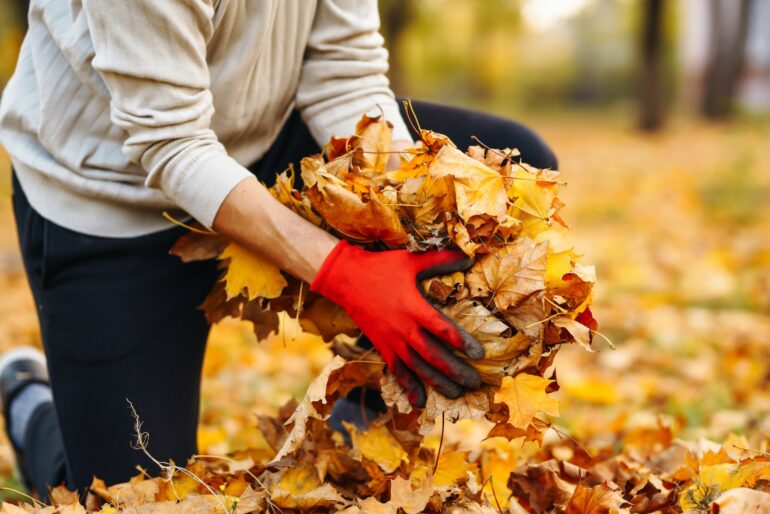Autumn is the season to gaze at gorgeous leaves of gold, yellow and orange as they flutter from the trees and fall on our yards – but then, of course, comes the tedious task of raking them up and trying to decide what to do with them. SciLine interviewed Susan Barton, a professor of plant and soil sciences at the University of Delaware, who says taking a lazy approach is actually a win for your garden and the critters that live there.
Dr. Susan Barton discusses fall lawn care.
Below are some highlights from the interview. Answers have been edited for brevity and clarity.
Can leaves on a landscaped property ever be left as they are, or should they always be mulched?
Susan Barton: A layer of leaves on the lawn will exclude light, which would be detrimental to the lawn. So when the leaves fall, either rake them up or chop them up with a lawn mower so they are finer and can sift down in through the grass blades. But if they fall in a landscape bed, or under trees, shrubs and larger plants, it’s fine to just leave the leaves without mulching them.
What are the benefits of mulching leaves rather than removing them?
Susan Barton: The leaves contain nutrients, and they also are a source of organic matter. So if you allow the leaves to go back into the landscape, you are providing nutrients for the plants to take up, and you are providing organic matter that will improve the soil structure.
If you think about forest, where leaves just naturally return to the soil and decompose every year, it’s some of the richest soil we have. By allowing that to happen in your landscape beds, you’re getting the same benefits.
What can keep leaves from blowing from one property to another?
Susan Barton: Chopping them up will dramatically reduce the blowing of the leaves. Make them smaller by either mowing over the leaves where they fall in the lawn, or raking them into piles and then mowing them.
There are also leaf vacuums that vacuum, chop up and put the leaves in a bag. Then you spread the leaves on your landscape beds.
What are the environmental benefits of not removing the leaves?
Susan Barton: If you rake up your leaves, put them in a black plastic bag and have them taken off to a landfill, then they never get to decompose and return those nutrients and organic matter back to the soil. Instead, you’re taking what could be a resource and making it a problem.
Also, many insects spend the winter in leaf litter. And a lot of people might not want insects in their landscape, but only about 2% of all the insects in the world are considered pests. Most of them are either beneficial or of no consequence to humans, and they are very important food sources for birds and other animals. Birds feed the insects, especially caterpillars, to their hatchlings.
So by allowing the insects to overwinter in the leaf litter, you’re supporting bird populations and, of course, pollinators, which help plants produce seeds that can develop…



